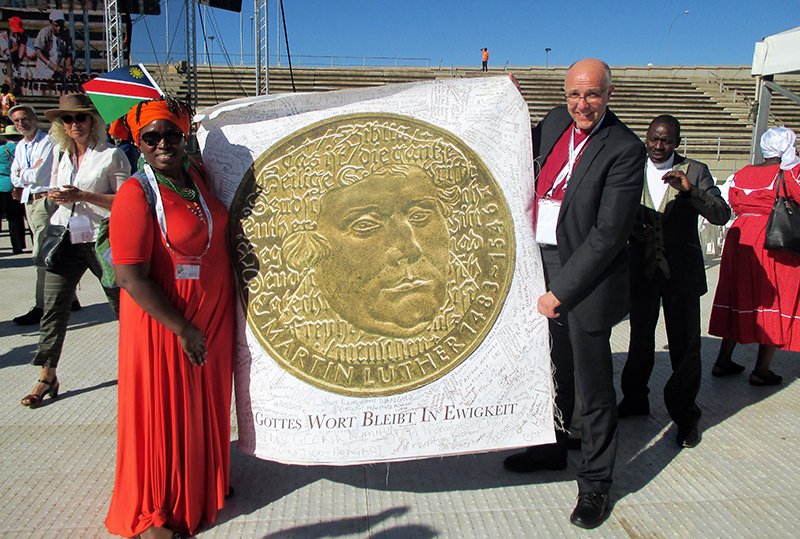
Chairman Hans-Jörg Voigt of the International Lutheran Council poses with a member of the Evangelical Lutheran Church in Namibia, which hosted the 2017 Assembly of the Lutheran World Federation. The banner quotes a portion of Luther’s German translation of the Bible: “Gottes Wort bleibt in Ewigkeit”—”The Word of the Lord stands forever” (1 Peter 1:25).
NAMIBIA – The Twelfth Assembly of the Lutheran World Federation (LWF) met May 10-16, 2017 in Winhoek, Namibia, and Chairman Hans-Jörg Voigt of the International Lutheran Council (ILC) was present as an ecumenical guest. Chairman Voigt is also Bishop of Germany’s Independent Evangelical Lutheran Church (SELK).
During their Assembly, the LWF celebrated the 500th anniversary of the Reformation with a service in the Sam Nujoma Stadium in the Capital of Namibia. In his greetings to the assembly, Chairman Voigt expressed his gratitude for the kind invitation to attend as an ecumenical observer. He noted that the ILC’s historical roots date back to the Prussian Empire in Germany, which grew in power throughout much of Germany in the nineteenth century. As part of that consolidation of power, the Prussian King enacted the Prussian Union of Churches in 1817, which forced a merger of Lutheran and Reformed churches.
A number of Lutheran congregations rejected this Prussian Union, especially because of differences between Reformed and Lutherans on the doctrine of the Lord’s Supper. Those who resisted the Prussian Union formed the “Old Lutheran Church” in Germany. But the Old Lutherans faced significant persecution from the government, with many of their pastors imprisoned, causing numerous Lutheran families to emigrate to the United States of America, Canada, Brazil, and Australia. In these new lands, they established Lutheran church bodies that adhered to the Lutheran Confessions—churches that today are members of the ILC. In addition to marking the 500th anniversary of the Reformation, then, 2017 also marks the 200th anniversary since the founding of the Union Church and the subsequent persecution of the Old Lutherans.
More recently, Chairman Voigt noted, “The origins of the International Lutheran Council proper can be traced to its foundational conference in 1952. “Today it represents 3.3 million Lutherans worldwide in 38 member churches.”
In his remarks, Chairman Voigt also addressed the confusion and mistrust which exists between some members of the ILC and the LWF. “What are the reasons for these frustrations?” he asked, noting we must take the concerns seriously. In particular, he said, we must ask: “Do we have a different understanding of hermeneutics for the use and understanding of our confessions?”
To better address these kinds of questions, the ILC and LWF began in 2005 a series of annual conversations. This year, the discussions included two theological presentations—one from each side—on the “The Importance of our Understanding of the Scriptures for the Unity of the Church.” In his address to the LWF, Chairman Voigt highlighted a selection from the LWF’s presentation (given by Rev. Dr. Hans-Peter Grosshans): “In the Lutheran tradition, priority was generally given to theology to express form and life out the church’s oneness and the unity of the various churches.”
Finally, Chairman Voigt noted the theme of the LWF Assembly—“Liberated by God’s Grace”—and provided two short sentences of commentary. “First we must remember, as Anselm of Canterbury says, that we should not underestimate human guiltiness and iniquity,” he explained. “Second, we must remember, as Martin Luther says, that it is nearly impossible to overestimate God’s grace; for He is like a glowing oven, full of love, reaching from earth to heaven.”
“I wish this overwhelming warm love in your hearts and into your Assembly,” he concluded.
On May 13, 2017 the LWF Assembly elected Rev. Dr. Musa Panti Filibus, the Archbishop of the Lutheran Church of Christ in Nigeria, as its new President. Chairman Voigt congratulated him on his election, and expressed pleasure in having had the opportunity to meet him earlier in 2012, when Dr. Filibus represented the LWF as an ecumenical guest to the ILC’s 2012 World Conference in Niagara Falls, Canada.
———————
